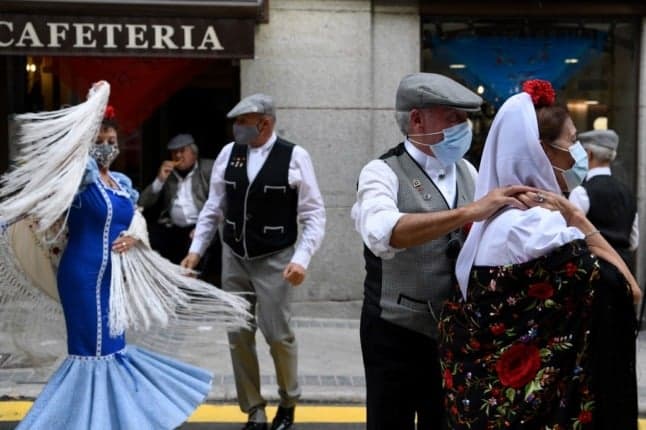Less social life but grateful: How Spaniards are suffering less pandemic fatigue than others

A surprisingly high number of Spaniards don’t feel that the pandemic has had a major impact on their lives and they're among the Europeans who are most "hopeful" about the future, several national and international studies reveal.
Almost half of Spaniards say they feel the pandemic has only affected them "a bit" (28.9 percent) or "not at all or almost not at all" (20.6 percent).
This is one of the standout findings of a survey carried out by Spain’s Centre for Sociological Research (CIS) looking into the consequences of Covid-19 on the Spanish population’s state of mind.
The most common negative effects the health crisis has had on the lives of those surveyed were on their relationships and lifestyle, work as well as health and healthcare matters, less so on the economy or their feelings.
However, around 14 percent of people interviewed by CIS said they’d felt more loneliness, sadness, fear, isolation, worry or sorrow over the loss of loved ones.
The main changes to people’s lifestyle were the "reduction, avoidance or limitation" of social life and to a lesser extent outings, activities and travel.
But most of the more than 3,000 people surveyed say that the pandemic has made them "value other things", such as what they already have in life, including their family and their health. They’ve also learned to “adopt more cautious habits” and “be more aware of the fragility of life”.
 A group of friends enjoy some beers in the Andalusian city of Seville in August 2020. (Photo by CRISTINA QUICLER / AFP)
A group of friends enjoy some beers in the Andalusian city of Seville in August 2020. (Photo by CRISTINA QUICLER / AFP)
Asked about the national and regional government’s handling of the pandemic, 55.8 percent of those surveyed said the authorities should "have taken stricter measures than those taken”, whilst 29.9 percent said the measures have been "adequate".
CIS’s study also found that around one in ten people surveyed had had Covid-19 and that 85 percent knew someone who had been infected.
Overall it may seem surprising that Spaniards’ concerns are more centred on their social life and relationships even though the pandemic has caused more than 80,000 deaths in Spain and the loss of 622,600 jobs in 2020.
But perhaps it’s this more light-hearted approach to life that explains why another recent study by international market research company IPSOS found that Spaniards and Italians are the countries which are suffering less from “‘pandemic fatigue”.
This concept has been defined by the World Health Organization (WHO) as the feeling of demotivation, fatigue, uncertainty and / or anxiety that affects the population due to the global health crisis and restrictions.
IPSOS found that "pandemic fatigue" is most common in Japan, Canada and the United Kingdom, whereas in Italy and Spain the majority of people feel "more hopeful" (78 and 75 percent respectively) about making future plans than with a sense of "monotony".
IPSOS also revealed that Spaniards were the least worried of all nationalities when it comes to eating and drinking at bars and restaurants during the pandemic (38 percent). Spain's hospitality sector is still subject to restrictions (varying depending on the regions) but compared to other European countries, bars and restaurants have not been completely shut for such long periods.
Another study carried out by Imperial College London in June 2021 found that Spain is the fourth country where citizens have the most trust in the Covid-19 vaccines available to them (78 percent), behind the United Kingdom (87 percent), Israel (83 percent) and Italy (81 percent).
Despite this optimism, IPSOS also found that Spaniards are the "Europeans who think that things in their country are out of control” the most, (48 percent in June, whereas in January it was 86 percent).
This ties in closely to the discontent with the government’s handling of the pandemic in the CIS study, and the historical distrust in public institutions among Spaniards.
READ ALSO:
Why do Spanish people say these English words when slamming Spain?
Comments
See Also
Almost half of Spaniards say they feel the pandemic has only affected them "a bit" (28.9 percent) or "not at all or almost not at all" (20.6 percent).
This is one of the standout findings of a survey carried out by Spain’s Centre for Sociological Research (CIS) looking into the consequences of Covid-19 on the Spanish population’s state of mind.
The most common negative effects the health crisis has had on the lives of those surveyed were on their relationships and lifestyle, work as well as health and healthcare matters, less so on the economy or their feelings.
However, around 14 percent of people interviewed by CIS said they’d felt more loneliness, sadness, fear, isolation, worry or sorrow over the loss of loved ones.
The main changes to people’s lifestyle were the "reduction, avoidance or limitation" of social life and to a lesser extent outings, activities and travel.
But most of the more than 3,000 people surveyed say that the pandemic has made them "value other things", such as what they already have in life, including their family and their health. They’ve also learned to “adopt more cautious habits” and “be more aware of the fragility of life”.
 A group of friends enjoy some beers in the Andalusian city of Seville in August 2020. (Photo by CRISTINA QUICLER / AFP)
A group of friends enjoy some beers in the Andalusian city of Seville in August 2020. (Photo by CRISTINA QUICLER / AFP)
Asked about the national and regional government’s handling of the pandemic, 55.8 percent of those surveyed said the authorities should "have taken stricter measures than those taken”, whilst 29.9 percent said the measures have been "adequate".
CIS’s study also found that around one in ten people surveyed had had Covid-19 and that 85 percent knew someone who had been infected.
Overall it may seem surprising that Spaniards’ concerns are more centred on their social life and relationships even though the pandemic has caused more than 80,000 deaths in Spain and the loss of 622,600 jobs in 2020.
But perhaps it’s this more light-hearted approach to life that explains why another recent study by international market research company IPSOS found that Spaniards and Italians are the countries which are suffering less from “‘pandemic fatigue”.
This concept has been defined by the World Health Organization (WHO) as the feeling of demotivation, fatigue, uncertainty and / or anxiety that affects the population due to the global health crisis and restrictions.
IPSOS found that "pandemic fatigue" is most common in Japan, Canada and the United Kingdom, whereas in Italy and Spain the majority of people feel "more hopeful" (78 and 75 percent respectively) about making future plans than with a sense of "monotony".
IPSOS also revealed that Spaniards were the least worried of all nationalities when it comes to eating and drinking at bars and restaurants during the pandemic (38 percent). Spain's hospitality sector is still subject to restrictions (varying depending on the regions) but compared to other European countries, bars and restaurants have not been completely shut for such long periods.
Another study carried out by Imperial College London in June 2021 found that Spain is the fourth country where citizens have the most trust in the Covid-19 vaccines available to them (78 percent), behind the United Kingdom (87 percent), Israel (83 percent) and Italy (81 percent).
Despite this optimism, IPSOS also found that Spaniards are the "Europeans who think that things in their country are out of control” the most, (48 percent in June, whereas in January it was 86 percent).
This ties in closely to the discontent with the government’s handling of the pandemic in the CIS study, and the historical distrust in public institutions among Spaniards.
READ ALSO:
Why do Spanish people say these English words when slamming Spain?
Join the conversation in our comments section below. Share your own views and experience and if you have a question or suggestion for our journalists then email us at [email protected].
Please keep comments civil, constructive and on topic – and make sure to read our terms of use before getting involved.
Please log in here to leave a comment.